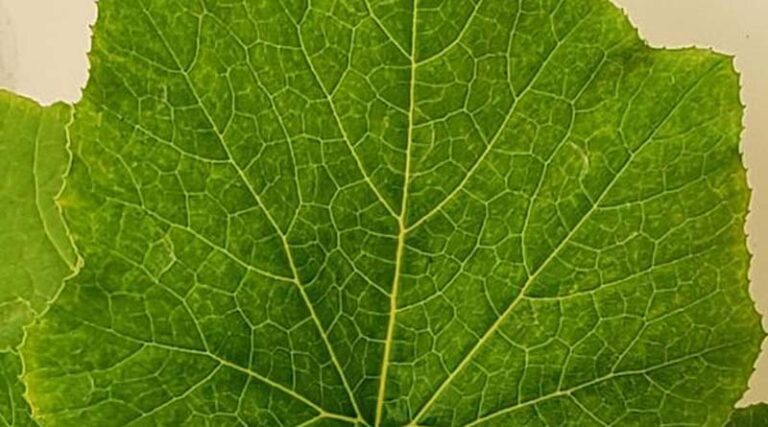
Agdia Releases Rapid Molecular Test Kit & Service for SqVYV (Squash vein yellowing virus)
Header Image: Figure 1. SqVYV symptoms on squash leaf. Image provided courtesy of William M. Wintermantel, USDA-ARS and EVCWG.
27 June 2025, Elkhart: Agdia, Inc. is happy to announce the commercial launch of a field-deployable rapid molecular test kit on their AmplifyRP® XRT platform for onsite detection of Squash vein yellowing virus (SqVYV).
For growers interested in sending plant samples to Agdia, this product will also be used by their Testing Services diagnostic laboratory, where customers receive expert guidance on crop screening and rapid turnaround time of test results.
Squash vein yellowing virus is a plant pathogenic virus primarily infecting cucurbit crops. While also present in the Middle East and Guatemala, it has recently spread extensively in the United States, primarily in southeastern states.
It is a member of the Ipomovirus genus (Potyviridae family) and is transmitted by the silverleaf whitefly (Bemisia tabaci), also known as the sweet potato whitefly. Other notable members of the Ipomovirus genus include Cassava brown streak virus (CBSV), Cucumber vein yellowing virus (CVYV) and Sweet potato mild mottle virus (SPMMV).
According to the European and Mediterranean Plant Protection Organization (EPPO), known hosts of SqVYV include melon (Cucumis melo), Queen Anne’s pocket melon (Cucumis melo var. dudaim), cucumber (Cucumis sativus), squash/pumpkins (Cucurbita pepo), watermelon (Citrullus lanatus) and bitter melon (Momordica charantia). Creeping cucumber (Melothria pendula) is also listed as an experimental host.
Symptoms of SqVYV infection include leaf vein clearing/chlorosis (Figure 1), vine decline (and subsequent plant death), deformed/unmarketable fruit and discoloration inside watermelon rinds. Watermelons are severely impacted by this virus, which causes a condition commonly known as watermelon vine decline (WVD).
Extensive validation studies for this new test were conducted to demonstrate fitness for purpose:
- Diagnostic specificity is 100% (61 out of 61 true negatives detected). No cross reactivity was observed with other pathogens tested during product validation.
- The new assay successfully detected 133 out of 135 positive samples, resulting in a diagnostic sensitivity of 98.5%.
- All isolates tested (including those from regions of the United States and from the Middle East) were successfully detected.
- This test has been validated for use in the following hosts: bitter gourd, bottle gourd, cucumber, melon, pumpkin, squash and watermelon.

About AmplifyRP®
Agdia’s new AmplifyRP® XRT assay for the detection of SqVYV is based on recombinase polymerase amplification (RPA). This technology promotes the rapid amplification and detection of nucleic acid targets, DNA or RNA, while maintaining a single operating temperature of 39–42 °C.
AmplifyRP® products achieve sensitivity and specificity comparable to PCR, while having clear advantages over the lab-based technology. AmplifyRP® products do not require a nucleic acid purification step; crude sample extracts are prepared using a simple extraction buffer and tested directly. When paired with Agdia’s AmpliFire® Pro isothermal fluorometer (Figure 2, coming soon!), the AmplifyRP® system is a user-friendly tool that can be implemented in the field or the lab by personnel with limited experience in molecular diagnostics. Total assay time is less than 30 minutes when used with the AmpliFire® as a real-time assay.
Also Read: Five Indians Recognized in 2025 Top Agri-Food Pioneers List by World Food Prize Foundation
📢 If You’re in Agriculture, Make Sure the Right People Hear Your Story.
Have a story the global agriculture industry should hear? From product launches to strategic announcements, Global Agriculture offers unmatched visibility across international agri-business markets. Connect with us at pr@global-agriculture.com to explore editorial and advertising opportunities that reach the right audience, worldwide.






